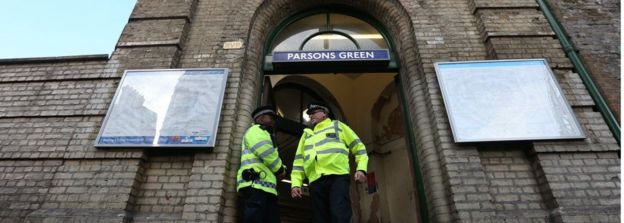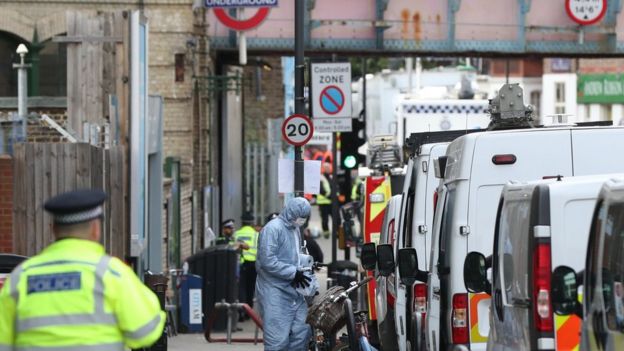
This article is more than
8 year oldOperation Temperer, which involves the use of the military was put in place after the threat level was raised and is being stepped up gradually.
Home affairs correspondent Danny Shaw said it is mainly focused on London and the south-east of England and is described as "light-touch", and not on the same scale as what was seen after the Manchester Arena attack.
Mayor of London Sadiq Khan said "significant" police activity would continue this weekend.
More armed police officers will be present at London Underground stations, as well as at stations across England, Scotland and Wales, British Transport Police Assistant Chief Constable Robin Smith told the BBC.
Most people caught in the blast were treated for minor injuries and have been released, NHS England said, but three people remain in Chelsea and Westminster hospital in central London.

By BBC security correspondent Frank Gardner
This is the fourth time the UK national terror threat level has been raised to critical since the system was made public in 2006.
The last time was in May following the Manchester Arena bombing, when it was wrongly thought the bomb-maker was still at large and could strike again.
On Friday the government delayed raising the threat level to critical for more than 12 hours under advice from the Joint Terrorism Analysis Centre. On Saturday the home secretary said it would remain at this level, implying that despite the arrest there is still thought to be a risk of another imminent attack.
Each time the level has gone to critical, it has only stayed at this highest level of alertness for three to four days - this is partly as it involves an unsustainably high tempo for the police, intelligence and security services.
Extra patrols are mounted on the streets of London, covert surveillance is stepped up and troops are deployed to free up police officers to focus on the main effort: catching the bomber before he can plant another device.
But the very fact that Friday's attack took place with no warning shows this system is only a broad guide to the threat and simply reflects the latest assessment.
The BBC understands CCTV images have been obtained of the person suspected of planting the explosive device.
The Islamic State group has said it was behind the bomb, which detonated at 08:20 BST on Friday.
It is understood the device had a timer, but the BBC's security correspondent Frank Gardner said the bomb appeared not to have gone off properly.

Had it worked as intended, it would have killed everyone around it and maimed everyone in the train carriage for life, he said.
The Met's Assistant Commissioner Mark Rowley said it was "very routine" for the Islamic State group to claim the attack, whether in contact with those involved or not.
They urge anyone with information to get in touch and to upload pictures and video to the website www.ukpoliceimageappeal.co.uk or to call the Anti-Terrorist Hotline on 0800 789 321.